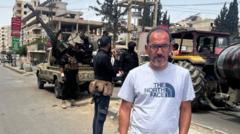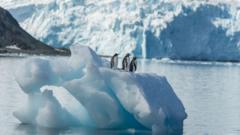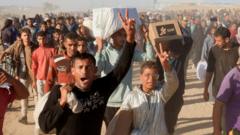In the morning of May 9, a BBC Arabic team embarked on a journey from Damascus to the southern province of Deraa, aiming to explore the Syrian territory occupied by Israeli forces since December. Driven by a desire to document the evolving situation following Israel's declaration of control over a demilitarized zone, the crew consisted of seven members, including British and Iraqi journalists alongside local Syrian freelancers.
As the team filmed near a United Nations observation post close to the town of al-Rafeed, they were approached by UN officials who informed them that the Israeli side had inquired about their identity and purpose. The crew then headed toward Quneitra city, a location designated as part of the buffer zone established under a 1974 disengagement agreement meant to maintain peace following the 1967 war.
While attempting to record footage about 200 meters from the city, the team encountered a makeshift checkpoint manned by Israeli soldiers. Their initial engagement escalated rapidly; within moments, the crew found themselves surrounded by armed soldiers who demanded they cease filming and lay their equipment aside. Despite attempts to clarify their status as journalists, their situation became increasingly dire.
The BBC has formally lodged complaints with the Israeli military regarding the incident, though as of this report, no response has been received. Approximately one minute after being approached, Israeli soldiers arrived in vehicles, confiscating the team's equipment and isolating them from communication with the outside world.
Hours of interrogation ensued, during which the team was subjected to humiliating searches and threats about their future reporting activities. After enduring a prolonged detention, the crew was ultimately released — found in a state of confusion — and returned safely to Damascus with their belongings, albeit with many personal materials deleted during the Israeli review process.
This incident reflects the ongoing tensions in the region and raises significant concerns about press freedom and the treatment of journalists working in conflict zones. It highlights the precarious balance between military security measures and the fundamental rights of reporters to document events in areas of crisis.
As the team filmed near a United Nations observation post close to the town of al-Rafeed, they were approached by UN officials who informed them that the Israeli side had inquired about their identity and purpose. The crew then headed toward Quneitra city, a location designated as part of the buffer zone established under a 1974 disengagement agreement meant to maintain peace following the 1967 war.
While attempting to record footage about 200 meters from the city, the team encountered a makeshift checkpoint manned by Israeli soldiers. Their initial engagement escalated rapidly; within moments, the crew found themselves surrounded by armed soldiers who demanded they cease filming and lay their equipment aside. Despite attempts to clarify their status as journalists, their situation became increasingly dire.
The BBC has formally lodged complaints with the Israeli military regarding the incident, though as of this report, no response has been received. Approximately one minute after being approached, Israeli soldiers arrived in vehicles, confiscating the team's equipment and isolating them from communication with the outside world.
Hours of interrogation ensued, during which the team was subjected to humiliating searches and threats about their future reporting activities. After enduring a prolonged detention, the crew was ultimately released — found in a state of confusion — and returned safely to Damascus with their belongings, albeit with many personal materials deleted during the Israeli review process.
This incident reflects the ongoing tensions in the region and raises significant concerns about press freedom and the treatment of journalists working in conflict zones. It highlights the precarious balance between military security measures and the fundamental rights of reporters to document events in areas of crisis.





















